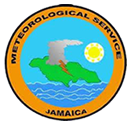Climate change can be defined as distinct changes in measures of climate lasting for a long period of time. It is therefore not ‘weather’ which a day-to-day phenomenon. Climate can vary on long timescales due to a variety of reasons including due to natural variations and also due to human induced activity. It is the change due to human activity which is most often being referenced when climate change is discussed. The human induced change results from increased concentrations of greenhouse gases (e.g. carbon dioxide and water vapour) in the atmosphere as a result of human activities such as the burning of fossil fuels and deforestation.
Greenhouse gases prevent the earth’s longwave radiation from reaching back into outer space and so keep the earth warm. This natural process, called the greenhouse effect, is being enhanced by the higher concentration of greenhouse gases in recent times, and so as the concentrations increase so does the earth’s surface temperatures. Research has shown that the increase in mean global temperatures of the last century, otherwise called global warming, has been primarily due to human activity. Projected impacts for Small Island Developing States, the grouping in which Jamaica falls, due to global warming include but is not limited to sea level rise, increasing temperatures, more frequent droughts, longer dry periods and more intense rainfall episodes.


